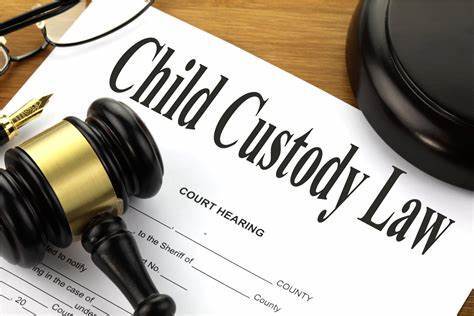How to Fight for Full Custody of Your Child: Tips and Advice
Going through a custody battle can be one of the most emotionally challenging experiences a parent will ever face. Whether you’re worried about your child’s safety, their emotional well-being, or their overall stability, seeking full custody is a serious legal undertaking. If you’re wondering how to get full custody of a child, this in-depth guide will walk you through the legal process, preparation strategies, and practical tips to help you protect your parental rights and do what’s best for your child.
Table of Contents
- Understanding Full Custody
- When Should You Seek Full Custody?
- How Courts Decide Custody Cases
- How to Get Full Custody of a Child: Step-by-Step
- Top 5 Questions About Getting Full Custody
- Common Mistakes to Avoid in Custody Battles
- Building a Strong Custody Case: Documentation and Behavior
- Temporary vs. Permanent Custody
- Emotional Impact on Children
- Working with Custody Evaluators and Experts
- Legal Rights of Non-Custodial Parents
- Creating a Safe and Child-Centered Home Environment
- Financial Considerations in Custody Battles
- Preparing for Post-Custody Co-Parenting
- Navigating Emergency Custody Requests
- Role of Mediation in Custody Disputes
- How The Law Office of Bobbie Young Can Help
- Contact The Law Office of Bobbie Young
1. Understanding Full Custody
In family law, “full custody” typically refers to a situation where one parent is granted legal and physical custody of a child. Legal custody includes decision-making authority over critical matters like education, health care, and religion. Physical custody determines where the child primarily lives.

There are two main types of full custody:
- Sole Legal and Physical Custody: One parent has complete authority, and the child lives with that parent full-time.
- Primary Physical Custody with Shared Legal Custody: One parent has the child most of the time, but decisions are made jointly.
Courts are generally hesitant to award full custody unless there are compelling reasons to do so, such as abuse, neglect, or a parent being deemed unfit. Full custody may also be awarded in cases where the non-custodial parent agrees to the arrangement.
2. When Should You Seek Full Custody?
While shared custody is often encouraged to ensure a child maintains strong relationships with both parents, there are valid situations where full custody is the safest and most beneficial arrangement:
- Substance abuse or addiction by the other parent
- Domestic violence or history of abuse
- Neglect or abandonment
- Incarceration of the other parent
- Mental health instability
- Relocation or lack of involvement
- Severe parental conflict or inability to co-parent
If these situations apply, you should act quickly and gather evidence. Your child’s well-being is the top priority, and you may need legal intervention to ensure their safety.
3. How Courts Decide Custody Cases
When courts decide on custody matters, they always focus on the child’s best interest. This legal standard is the foundation for every decision and includes several key factors:
- The child’s physical, emotional, and developmental needs
- The ability of each parent to provide a stable, nurturing environment
- The mental and physical health of both parents
- History of caregiving and parental involvement
- The child’s preference (depending on age and maturity)
- Any evidence of abuse, neglect, or endangerment
- Each parent’s willingness to support the child’s relationship with the other parent
Contrary to popular belief, courts do not automatically favor mothers or fathers. They assess each case individually and base their ruling on what arrangement best supports the child’s overall development and safety.
4. How to Get Full Custody of a Child: Step-by-Step
If you’re serious about pursuing full custody, follow these critical steps to build a solid case:

1. Consult with a Family Law Attorney
Seek legal advice from a qualified attorney who specializes in custody disputes. The Law Office of Bobbie Young can provide guidance tailored to your state laws and specific case.
2. Gather Documentation and Evidence
You need clear, documented evidence to support your request for full custody. This may include:
- Text messages, emails, voicemails
- Police reports or medical records
- Testimonies from teachers, neighbors, or family members
- Documentation of missed visitations or irresponsible behavior
3. Demonstrate Stability and Involvement
Show the court that you provide a stable home, are involved in your child’s education and extracurricular activities, and have a long-standing track record of responsible parenting.
4. Stay Focused and Civil
Avoid arguing with the other parent or acting out emotionally during court proceedings. Judges evaluate your behavior as part of the custody decision.
5. Attend Court Hearings and Mediation
Be prepared to attend all required court sessions and comply with any mediation efforts the court may order. Courts often expect attempts at resolution before awarding full custody.
5. Top 5 Questions About Getting Full Custody
1. Do I Need Proof to Get Full Custody?
Yes. Judges rely on documented evidence and credible testimony to evaluate custody claims. Vague accusations are not enough concrete examples of neglect, abuse, or instability are necessary.
2. Can I Get Full Custody Without Going to Court?
Full custody can sometimes be awarded through mutual agreement between parents and approved by a judge. However, in contentious situations, a court hearing is typically required.
3. Does My Child’s Preference Matter?
In many states, a judge may consider the child’s opinion, especially if the child is over 12 years old and expresses a clear, reasonable preference.
4. How Long Does the Custody Process Take?
Custody cases can take a few weeks to several months, depending on complexity, evidence, and court availability. Emergency custody can be granted more quickly in urgent cases.
5. Can Custody Be Changed Later?
Yes. Custody arrangements can be modified if circumstances change. However, you must demonstrate a significant change that affects the child’s welfare to justify a new custody order.
6. Common Mistakes to Avoid in Custody Battles
Making inevitable mistakes during your custody case can seriously jeopardize your chances of success. Avoid the following:
- Disobeying court orders
- Speaking negatively about the other parent in front of the child
- Failing to attend court hearings or mediation sessions
- Exhibiting aggressive or volatile behavior
- Using your child as a weapon or messenger
Judges notice everything, and your conduct throughout the process matters just as much as your legal arguments.
7. Building a Strong Custody Case: Documentation and Behavior
One of the most powerful tools in a custody case is your ability to document and demonstrate responsible, consistent parenting. Courts value actions over words.

Tips for Strong Documentation:
- Maintain a parenting journal that includes drop-off/pick-up times, behavioral notes, and parenting concerns.
- Keep copies of report cards, doctor’s notes, school communications, and incident reports.
- Use a co-parenting app to manage scheduling and communication, and to create a verifiable record of all interactions.
Model Positive Behavior:
- Show respect for the legal process and the court’s orders.
- Prioritize your child’s emotional needs over personal grievances.
- Remain calm and composed during hearings and mediation.
Judges tend to favor the parent with maturity, emotional stability, and a genuine commitment to the child’s best interests.
8. Temporary vs. Permanent Custody
Understanding the difference between temporary and permanent custody is essential in setting expectations during your legal journey.
Temporary Custody can be awarded during legal proceedings, especially if there are concerns about a child’s safety. These orders remain in place until the final court decision.
Permanent Custody is granted after the case and reflects the court’s final determination of what arrangement best supports the child.
It’s important to note that “permanent” custody can still be modified later, but only if you show a material change in circumstances that affects the child’s well-being.
9. Emotional Impact on Children
In custody disputes, children often experience a wide range of emotions. The process can be traumatic even if one parent is more stable or involved. Children may feel caught in the middle, confused about loyalty, or even responsible for the conflict.
Common emotional responses in children include:
- Anxiety or depression
- Regression in behavior (e.g., bedwetting, tantrums)
- Academic struggles
- Withdrawal from friends or favorite activities
- Physical symptoms like headaches or stomachaches
Understanding the emotional stakes reinforces why seeking full custody must be done thoughtfully and with the child’s mental health in mind. When pursuing custody, be mindful of:
- Maintaining routines to offer a sense of stability
- Encouraging honest communication without judgment
- Reassuring the child that they are loved and not at fault
Working with child psychologists or family counselors can ease this transition and help children develop resilience.
10. Working with Custody Evaluators and Experts
Courts often rely on custody evaluators to assess the family dynamic in contested custody cases. These experts usually mental health professionals conduct in-depth interviews, home visits, and psychological testing to make recommendations to the judge.
What to expect from a custody evaluation:
- Interviews with both parents
- Interviews or observations of the child
- Visits to each parent’s home
- Review of documentation (court records, school reports, etc.)
- Possible psychological testing of parents and children
Tips for working with evaluators:
- Be honest and cooperative
- Focus on your child’s needs, not grievances with the other parent
- Ensure your living space is clean, safe, and welcoming
- Keep detailed records that support your claims
The evaluator’s recommendation can significantly influence the court’s decision. Throughout the process, being prepared, respectful, and child-focused will increase your credibility and likelihood of success.
11. Legal Rights of Non-Custodial Parents
It’s important to understand that even when one parent is granted full custody, the other parent, the non-custodial parent, still has rights unless those rights are legally terminated. These rights can include:
- Visitation (supervised or unsupervised)
- Access to school and medical records
- The right to be informed of significant changes in the child’s life
In cases where the non-custodial parent has a history of abuse, neglect, or endangerment, courts may restrict or eliminate these rights. However, courts are often reluctant to sever parental bonds without substantial justification. If you’re seeking full custody, it’s crucial to demonstrate why limiting or removing these rights serves your child’s best interest.
Parents granted full custody should also be prepared to handle the added legal authority responsibly. This includes keeping thorough records of decisions made, supporting healthy development, and cooperating with the court system when required.
12. Creating a Safe and Child-Centered Home Environment
Judges examine the home environment closely when determining full custody arrangements. A parent seeking sole custody must demonstrate that their home is a place where the child can thrive physically, emotionally, and developmentally.

Key considerations include:
- Stability: Demonstrate consistent routines, secure housing, and long-term plans.
- Safety: Ensure your home is free from hazards, domestic violence, and criminal influences.
- School Support: Be actively involved in your child’s academics and extracurricular activities.
- Emotional Nurturing: Create a warm and communicative environment where your child feels safe expressing feelings.
- Health and Wellness: Show that medical appointments, nutrition, hygiene, and exercise are prioritized.
You don’t need a mansion what matters most is showing that your home is clean, structured, and centered on the child’s growth and well-being.
Please include photos of your child’s living space, daily schedule, and any activities supporting their development. These tangible examples can help strengthen your case.
13. Financial Considerations in Custody Battles
While most custody decisions are rooted in the child’s best interest, financial stability is crucial in custody proceedings. Courts look at your ability to provide emotionally and materially for your child’s needs.
Important financial aspects include:
- Income and employment stability
- Ability to maintain housing, food, and healthcare
- Access to insurance for the child
- Willingness to pay or request child support if needed
It’s wise to compile your financial documents in advance, including:
- Recent pay stubs and tax returns
- Childcare and school-related expenses
- Lease or mortgage documents
- Utility bills and health insurance premiums
Being financially prepared demonstrates that you can provide a secure and consistent environment to the court. These should also be clearly outlined if you’re the non-working parent but have other means of support (e.g., family help, savings, alimony).
14. Preparing for Post-Custody Co-Parenting
Winning full custody does not always mean the other parent disappears. Courts will often still award visitation or limited contact to the non-custodial parent. To maintain a healthy dynamic for your child, you must be prepared for ongoing co-parenting responsibilities even in high-conflict situations.

Post-custody co-parenting tips:
- Set clear boundaries: Use court orders as the foundation for visitation schedules and communication expectations.
- Use parenting apps: Tools like OurFamilyWizard or TalkingParents can streamline communication and document interactions.
- Stay child-focused: Avoid discussing legal battles or personal frustrations in front of the child.
- Follow all court orders strictly: Compliance builds trust with the court and protects your custody status.
Sometimes, therapeutic co-parenting counseling may be ordered to improve the parental relationship and shield the child from ongoing conflict. The goal is to create the most peaceful, predictable environment possible for the child’s sake.
15. Navigating Emergency Custody Requests
In cases where a child is in immediate danger, you may need to file an emergency custody motion. This legal request allows the court to intervene quickly and temporarily award custody to one parent, bypassing the typical legal timeline.
Common reasons for emergency custody include:
- Physical or sexual abuse
- Drug or alcohol abuse in the home
- Threats or evidence of abduction
- Immediate neglect or unsafe living conditions
To support your emergency custody claim, gather:
- Police or Child Protective Services reports
- Medical records or photographs of injuries
- Text messages or voicemails that demonstrate the threat
Emergency hearings are usually held within a few days of filing. If granted, the order will remain in effect until a full hearing is scheduled to determine permanent custody arrangements.
16. Role of Mediation in Custody Disputes
Mediation is a confidential and often court-mandated process that allows both parents to discuss and resolve their custody issues with the help of a neutral third party. While full custody disputes are more likely to go to trial, mediation can be effective even in contentious cases.
Benefits of mediation include:
- Lower emotional and financial cost compared to litigation
- More control over the outcome for both parents
- Faster resolution
- Reduced stress for the child
Mediators help identify areas of agreement and guide discussion toward a resolution. Even if full custody is not agreed upon, partial arrangements such as visitation or decision-making roles may be worked out. If mediation fails, the case proceeds to a court hearing.
Being open to mediation can demonstrate your willingness to act in the child’s best interest and may influence how a judge views your overall approach to parenting.
17. How The Law Office of Bobbie Young Can Help
Navigating the path to full custody requires a strategic approach, emotional strength, and an experienced legal advocate. The Law Office of Bobbie Young specializes in representing parents in high-stakes custody cases.
Our team will help you:
- Develop a strong legal argument supported by evidence
- Protect your parental rights during hearings and mediation
- File emergency motions if your child is in immediate danger
- Prepare you for court testimony and cross-examination
- Negotiate parenting plans that support long-term well-being
- Coordinate with child psychologists and custody evaluators when needed
- Prepare financial and home documentation to support your case
- Create co-parenting plans that comply with legal and emotional standards
- Guide you through mediation with professionalism and compassion
We treat every case with care, compassion, and fierce dedication to doing what’s right for your child.

18. Contact The Law Office of Bobbie Young
Please don’t go through it alone when your child’s safety, stability, and future are at stake. If you’re wondering how to get full custody of a child, the Law Office of Bobbie Young is here to fight for you,
Your child deserves a safe, loving, and supportive environment let us help you realize that. Contact us today to schedule your consultation.
Your Legal Solution Starts Here
Clear, practical legal advice you can count on when it matters most